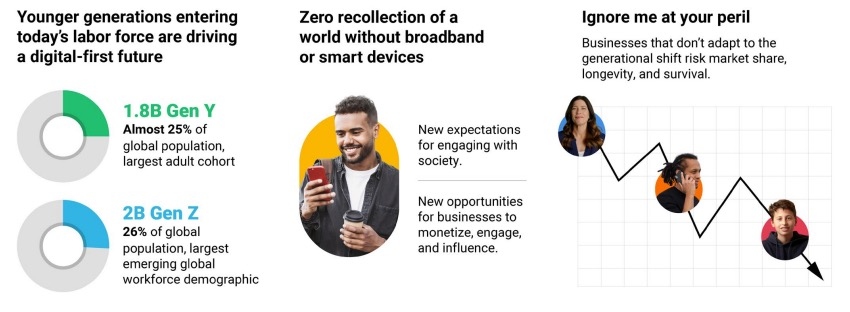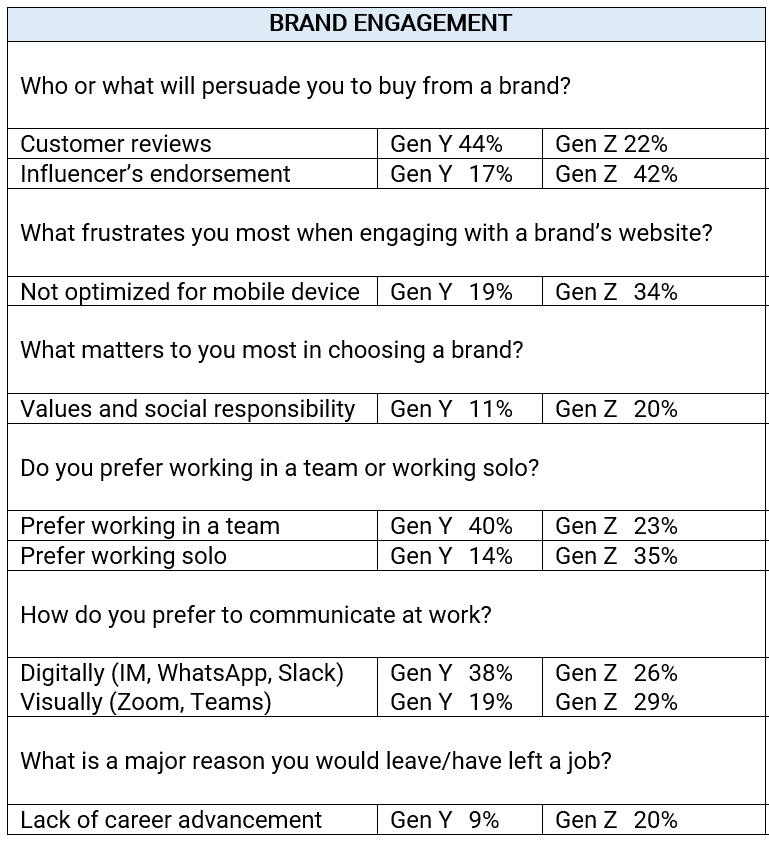As the population ages, next-generation cohorts will increasingly make their mark at work and in society. Organisations that seek to hire and retain them as employees or earn their trust as customers must understand and adapt to their attributes. Alexander Grous interviewed two hundred generations Y and Z members from five countries (the UK, France, Germany, Norway, and Sweden) and explored their attitudes and actions related to work and social activities.
The ‘new normal’ is anything but new. Two generations have defined this state considerably before the onset of the pandemic: generation Z (‘Gen Z’), born between 1997 and 2012 (aged 10-25); and generation Y (millennials, ‘Gen Y’), born between 1982 and1996 (aged 26-41). This research extends work commenced in 2010 and illustrates how Gen Y and Gen Z differ from prior generations, pivoting on the core question: What do Gen Y and Gen Z really want? In 2022, we interviewed two hundred Gen Y and Z members from five countries (the UK, France, Germany, Norway, and Sweden). We used 24 questions exploring attitudes and actions related to work and social activities.
As the population of baby boomers and Generation X decreases, these next-gen cohorts will increasingly make their mark at work and in society. Organisations that seek to hire and retain them as employees or earn their trust as customers must understand and adapt to their attributes. They are digitally native ‘always-on’ and seek freedom, flexibility, immediacy while embodying tolerance and activism. Organisations and brands that disregard them risk their market share, longevity, and ultimately, their survival.
Figure 1. Who are Gen Y and Gen Z?

Copyright: © Alexander Grous, All rights reserved.
Figure 2. What do Gen Y and Gen Z want?

Copyright: © Alexander Grous, All rights reserved.
When choosing an employer or a job, it’s not all about money for these cohorts: both Gen Y and Gen Z have been defining the value and flexibility of hybrid working before the pandemic. In addition, these cohort value the freedom to travel more than a higher salary or job security. They seek sufficient autonomy enabled by the tech-based tools they are used to using, to work in their preferred style, whether it is alone or collaboratively over apps like Slack and Workplace. They reject helicopter-style micro-management and expect work-related issues to be addressed rapidly. They expect information to be obtained easily, seamlessly, and quickly, via smart chatbots and omnichannel support tools such as self-service apps and portals. Unlike their predecessors, these cohorts show a high disposition to leaving an organisation or brand if they become dissatisfied.
When interacting with brands, these cohorts are more likely to use a chatbot or instant messaging than make a phone call or send an email to customer support. Their biggest frustrations with interacting with a brand are poor site design, ‘text-heavy’ pages that lack visual content, and lack of optimisation for easy accessibility and use. They prefer digitally enabled face-to-face communication over phone calls and emails, but are happy to meet face to face when required. Below are the key takeaways from the research.
New rules of engagement for generations Z and Y as employees
What to do
Offer flexible, hybrid work models. Gen Y and Gen Z want to shop and work from anywhere and utilise their time off to travel. Salary has been displaced as the main factor in selecting an employer over time, with work flexibility now the key influencing factor.
Allow cohorts to define their preferred workstyle: Employers should offer Gen Y and Gen Z a degree of autonomy to define where and how they want to work. Around 44% of Gen Y and Gen Z prefer a flexible combination of individual work and team collaboration.
Provide the digital tools they want and expect: Just as they expect instant communication with brands using social media and apps, Gen Y and Gen Z expect easy-to-use, AI-enhanced apps in the workforce for communication and support. Employers need to offer chatbots and omni-channel self-service support for 24/7 access to data, instant assistance, and real-time resolution of queries.
What not to do
Avoid micromanaging and rigid work conditions. Gen Y and Gen Z expect freedom and flexibility from their employers. Micro-managing their time, including setting hours, onsite-only presence, are among the biggest turnoffs for these cohorts, and key drivers spurring their departure from an employer.
Don’t rely on email for day-to-day communication. In contrast to older generations that use email as a primary communication tool, Gen Y and Gen Z employees prefer fast-response IMs and digital face-to-face interactions over Zoom and Teams.
Table 1. Where generations Y and Z differ
Gen Y and Gen Z displayed alignment on many preferences and expectations in their engagement with organisations and brands, but a number of areas depicted a higher divergence.

The results from this research confirm a key observed pre-pandemic trend for Gen Y and Gen Z: technology is integral to engaging with these cohorts. Born and raised in a digitally native world, they expect the immediacy, freedom, and flexibility that social media, apps, and IM provide. Evolving social mores, advocacy for social causes and rapid entry and exit from organisations and brands requires flexibility, adaptability, and relevance. Organisations and brands that ignore these tenets are likely to struggle in their ability to attract or retain employees and customers. As these cohorts become the next generation of leaders, organisations and brands that are not prepared for them may find that the ‘new normal’ looks completely different to the current or old ‘normal’—and is not for the feint-hearted.
♣♣♣
Notes:
- This blog post is based on research conducted by the author for LSE Consulting, which acts as a bridge between LSE academics and clients across the world.
- The post represents the views of its author(s), not the position of LSE Business Review or the London School of Economics.
- Featured image by by Antoine J. on Unsplash
- When you leave a comment, you’re agreeing to our Comment Policy.






Teamwork compared with individual work really stands out to me. But what will be the long-term impact of not having to engage in teams and learn the skills of communication? What does that mean for relationship outside of work – friendships, community groups, marriage/partnership?
How does this impact creative collaboration?